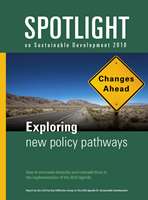Social Watch E-Newsletter - Issue 333 - August 27, 2018
Published on Mon, 2018-08-27 10:25
 |
| Issue 333 - August 27, 2018 |
|
|
Social Watch reports
Spotlight report on the 2030 Agenda
|
|
|
| |
|
| |
SDGs in Bangladesh: Key challenges and missing links
|
| |
|
| |
 |
The UN Committee for Development Policy has announced Bangladesh’s eligibility for graduation from Least Developed Country to Developing Country. This success also brings confidence for achieving the SDGs. In the last 15 years, with limited resources, Bangladesh has witnessed one of the fastest reductions in poverty anywhere in the world. The country has met the target in reducing the proportion of population below the national poverty line (currently 22.4%) three years ahead of time. It has reached the targets in reducing infant mortality rate from 92 per 1000 live births in 1990 to 46 now; and in decreasing the prevalence of underweight children less than five years of age from 66 percent in 1990 to 32.6 percent at present. In terms of education, the country has achieved nearly 100 percent enrollment in primary schools; and attained gender parity with more girls than boys in primary and secondary schools.
But, to achieve the SDGs, Bangladesh faces some considerable challenges: Bangladesh will need a huge investment for basic infrastructure like roads, rail and ports; power stations; water and sanitation and also for sectors like agriculture and rural development, climate change mitigation and adaptation, health and education. But recent trends in investment in these sectors are not up to desired level. Budgetary allocation on the health sector was about 0.7 percent of GDP during FY 2003-2014, compared to the recommended WHO level of 5 percent. Education gets 2 percent of GDP during FY 2003-2014, compared to the 6 percent advised by UNESCO. Read more
|
| |
|
| |
|
| |
Policies that strengthen the nexus between food, health, ecology, livelihoods and identities
|
| |
|
| |
 |
Food is at the core of the nexus between identities, health, ecology and livelihoods, an intrinsic space where different important dimensions of life converge. Yet, policy discussions and deliberations that impact on food and food systems are often fragmented and incoherent. This article explores the close connection between these different domains and offers feasible pathways on how to place the virtuous interplay between sustainable and diversified local food systems and healthy diets at the core of the public policy agenda. It argues that turning to what is defined as the Peasant Food Web is the most effective strategy to address multiple intertwined challenges and offers concrete policy proposals that can facilitate the transition to agroecology and support peasants in feeding the world through a reinforcing loop between biodiversity, nutrition, health and livelihoods. Such a strategy requires significant efforts to ‘de-silo’ the current policy approach to what are often mistakenly addressed as separate challenges and break down the artificial boundaries imposed by the institutional settings that support each of the interconnected Sustainable Development Goals (SDGs). This could lead to a new coherent and holistic narrative that can inspire and guide the profound transformations envisioned in the 2030 Agenda. Read more
|
| |
|
| |
Social Watch publishes country reports 2018
Social Watch coalitions around the world are contributing their assessments and reports to the global Social Watch report 2018 on the national implementation of the 2030 Agenda. While circumstances and capabilities are unique in each country, common threads emerge: Inequalities, often exacerbated by the international policy framework, are not being reduced, poverty is underestimated or hidden but not eradicated, sustainability is sacrificed to extractivism.
The Social Watch national platforms are independent coalitions of civil society organizations struggling for social and gender justice in their own countries. The Social Watch network has been publishing since 1996 yearly reports on how governments implement their international commitments to eradicate poverty and achieve equality between women and men.
|
| |
|
| |
|
| |
Silenced activists, silenced official delegations: Who will speak for Palestinians?
|
| |
|
| |
With over a 50 year struggle under Israeli occupation, Palestinians’ call for the right to self-determination is not something new. Systematic and gross human rights violations they face neither.
They are daily realities for Palestinians; while their country is now being defined as “least desirable, the least inviting and the least livable place on earth”.
However their struggle for freedom is constant. In each and every occasion they call for an immediate end to occupation and blockade of the Gaza Strip and the ethnic cleansing in Jerusalem and other places in West Bank. They urge Israeli authorities to respect all United Nations resolutions and its obligations under international law recognizing their right to self-determination. Civil society activists and human rights defenders are at the forefront becoming a voice for these calls. They advocate for international solidarity and action as well. Read more
|
| |
|
|
|
| |
|
SOCIAL WATCH IS AN INTERNATIONAL NGO WATCHDOG NETWORK MONITORING POVERTY ERADICATION AND GENDER EQUALITY Social Watch >>
Social Watch E-Newsletter For comments, sugestions, collaborations contact us at: socwatch@socialwatch.orgTo stop receiving this newsletter send a message with the subject "unsubscribe" to: socwatch@socialwatch.org |
|
|
|
|
